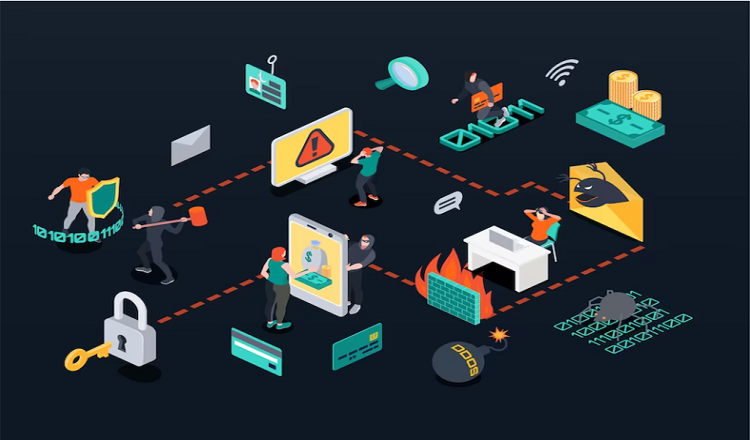The potential of emerging technologies such as blockchain and quantum computing to improve cybersecurity and data privacy
Our lives are becoming more and more entwined with technology in today’s fast-paced digital world. Technology has permeated every aspect of our everyday lives, from our personal devices to the systems that power our enterprises. But as our reliance on technology grows, it is more important than ever to have strong cybersecurity and data protection controls in place. It’s critical to create cutting-edge solutions to safeguard against these threats as cyberattacks and data breaches increase.
Fortunately, cutting-edge technologies like blockchain and quantum computing have the potential to completely change how we think about data privacy and cybersecurity. These innovations provide a higher level of protection that can aid in defending against even the most complex cyberthreats. For example, blockchain technology offers a transparent and safe means of storing and transferring data, making it the perfect answer for protecting sensitive data. However, because regular encryption techniques can be defeated by quantum computing, unbreakable encryption that can fend off even the most sophisticated cyberattacks can be developed.
In this blog, we’ll look at how cutting-edge technologies like blockchain and quantum computing could enhance data privacy and cybersecurity. We will go through the fundamentals of these technologies, how they may be used to improve cybersecurity, and each one’s advantages and disadvantages. You’ll have a greater knowledge of how cutting-edge technologies can shield your digital assets and keep you secure from online dangers by the time you finish reading this article. So let’s get started!
Introduction to Blockchain Technology
Blockchain technology offers secure and transparent transactions through a decentralized, distributed ledger. A blockchain is essentially a database that stores data in chronologically ordered blocks that are connected together. It is practically impossible to corrupt or tamper with data because each block contains a set of transactions and is validated by a network of users.
Blockchain technology is particularly well-suited for cybersecurity because of its immutability, transparency, and decentralization. Any data saved on the blockchain cannot be changed or erased without leaving a trail since it is immutable. A perfect solution for secure data storage and transfer, the blockchain’s openness also makes it simple to follow and audit transactions.
There are numerous case studies showing how blockchain is currently used in cybersecurity, such as supply chain management, secure data storage, and identity management. For instance, IBM utilizes blockchain technology to secure the food supply chain, while the Estonian government uses it to protect citizen data. In general, blockchain technology has the power to completely change how we approach cybersecurity and defend against online attacks.
Blockchain improves cybersecurity potential
Cybersecurity measures could be considerably improved by blockchain technology. Data tampering prevention is one of blockchain’s most noteworthy advantages. The blockchain is a decentralized database, making it nearly impossible to modify or tamper with data because any attempt to do so will be discovered by the network of users.
Identity management is a further area where blockchain technology might improve cybersecurity. People can have more control over their personal data and privacy by adopting blockchain for identity verification and authentication. With blockchain, users can have a secure, decentralized, and unchangeable digital identity.
Blockchain technology can also be used to protect supply networks, preventing product fraud and tampering. Businesses may make sure their goods are genuine and unaltered by tracking every step of the supply chain on a blockchain. This can shield organizations from reputational harm and help avoid cyberattacks. In general, blockchain technology has enormous potential to completely transform how we handle data privacy and cybersecurity.
Introduction to Quantum Computing
Information processing is done using the principles of quantum physics in the relatively young discipline of computing known as quantum computing. Quantum computers, as opposed to conventional ones, use qubits, which can exist in several states at once and enable vastly faster processing rates.
The major capabilities of quantum computing that make it appropriate for cybersecurity include the capacity to decrypt data using conventional encryption techniques, do complex computations at breakneck rates, and simultaneously analyze massive volumes of data. As a result, quantum computing is an effective tool for identifying and thwarting cyberattacks.
Currently, encryption, intrusion detection, and secure communication are some of the cybersecurity jobs that involve quantum computing. For instance, the European Union is investing in quantum computing for secure communication while the National Security Agency (NSA) is studying the use of quantum computing for cryptography. As quantum computing technology develops, it has the potential to fundamentally alter how we approach data privacy and cybersecurity.
Quantum computing’s potential to improve cybersecurity
Cybersecurity measures could be dramatically improved by quantum computing. The capacity of quantum computing to enhance encryption techniques is one of its main advantages. Quantum cryptography algorithms can offer greater protection in the face of quantum computing threats than conventional encryption techniques.
Quantum key distribution for secure communication is another way that quantum computing can improve cybersecurity. Users can interact securely without worrying about eavesdropping by using quantum entanglement to distribute cryptographic keys.
Quantum computing can also be used to identify and stop cyberattacks. Large volumes of data may be analyzed concurrently via quantum computing, making it simpler to spot irregularities and stop cyberattacks.
In general, quantum computing has the potential to fundamentally alter how we approach data privacy and cybersecurity. The technology has the potential to develop into a potent weapon in the fight against cybercrime.
Comparing pros and cons: blockchain vs quantum computing
When it comes to increasing cybersecurity measures, blockchain and quantum computing each have their benefits and drawbacks. While quantum computing has tremendous processing capabilities that can identify and stop cyber assaults, blockchain technology offers a decentralized database that is secure and impenetrable. However, the implementation of blockchain technology can be slow and expensive, whilst quantum computing is still in its infancy and may require a substantial investment to develop.
Despite their shortcomings, there is a chance to combine these technologies to make cybersecurity solutions that are even more effective. For instance, employing quantum computing to improve the capabilities of blockchain’s data validation or using blockchain to secure quantum communication. These two technologies working together might offer a more reliable and safe method of handling data privacy and cybersecurity.
Conclusion
Cutting-edge technologies like blockchain and quantum computing have a huge potential to improve data privacy and cybersecurity in the current digital era. Blockchain technology can offer tamper-proof, secure data storage, while quantum computing has the processing ability to stop and detect cyberattacks. To fully exploit the promise of these technologies, further research and development are still required.
Even though these technologies have a lot of potential, they are not without drawbacks. While quantum computing is still in its early stages and requires major expenditure to develop, blockchain technology can be slow and expensive to install. The potential downsides of these technologies, such as the likelihood of novel cyberattacks or privacy issues, must also be carefully explored.
Therefore, it is advised that businesses make research and development investments to examine the possibilities of these new technologies while simultaneously giving solid cybersecurity policies and risk management techniques top priority. By doing this, we can use blockchain technology and quantum computing to create a more stable and secure digital future.
Read More You May Like:














Post Comment